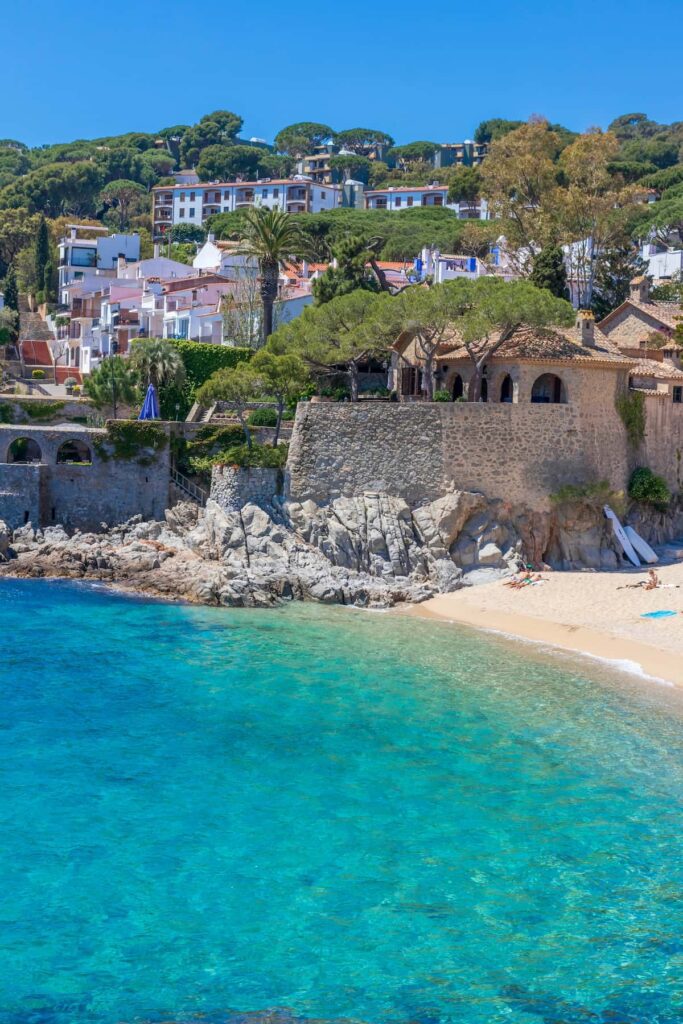Eco Tourism in Spain
This article may contain affiliate/compensated links. For full information, please see our disclaimer here.
Are you looking for a unique and sustainable way to explore Spain? Look no further than eco-tourism. Eco-tourism in Spain is a growing trend, with more and more travelers seeking out green travel that include environmentally-friendly and socially responsible ways to experience the country’s natural beauty and cultural heritage.
Read on to discover more about how to travel green in Spain, including information on the country’s best eco-friendly destinations, how you can be an eco-tourist in Spain, and recommended eco friendly travel gear.
Eco Tourism in Spain: Key Takeaways
If you’re looking for a green travel experience, then eco tourism in Spain might be just what you need. With its diverse natural spaces, rich culture, and commitment to sustainable tourism, Spain offers a range of eco-friendly activities and destinations that cater to different interests and budgets.
- Eco-tourism in Spain is a growing trend that offers a unique and sustainable way to explore the country’s natural beauty and cultural heritage.
- Eco-tourism is a form of sustainable tourism that aims to minimize the negative impact on the environment and local communities while promoting conservation and education.
- By choosing to be an eco-tourist, you can help support the local economy and preserve the natural and cultural heritage of Spain for future generations.
- Top green travel destinations in Spain are Doñana National Park, Sierra Nevada National Park, the Alpujarra, the Spanish islands, and Spain’s beaches.
- Eco tourism in Spain is not just nature-focused; it also includes cultural activities that help to preserve local traditions, art forms, and products.

What is Eco Tourism and Why It’s Important
Eco tourism is a form of travel that focuses on responsible and sustainable tourism practices. It’s also often referred to as “green travel”, “sustainable travel”, “conscious travel” and “responsible travel”. This way of travelling involves visiting natural areas and cultural sites while minimizing the impact on the environment and supporting local communities. Eco tourism seeks to educate travelers about the importance of conservation and preservation of natural resources and cultural heritage.
When you engage in eco tourism, you are making a conscious effort to travel in a way that benefits the environment and local communities. This means choosing accommodations, activities, and transportation that are environmentally-friendly and socially responsible. For example, you may choose to stay in a hotel that uses renewable energy sources, participates in recycling programs, and supports local conservation efforts.
Sustainable travel also involves participating in activities that promote conservation and preservation of local ecosystems and cultural heritage. This may include hiking, bird watching, and volunteering for conservation projects. By participating in these activities, you are contributing to the protection and preservation of natural and cultural resources.
I am lucky enough to have travelled even since I was a tiny tot (thanks mom and dad!) and as I’ve gotten older, I’ve become more conscious about the impact that travel can have on the places I’ve visited, the people who live there, and the environment. And so over time, I’ve become more mindful about how I travel. Green travel is a way to travel that allows me (and you!) to experience the beauty and wonder of the world while making a positive impact on the environment and local communities.

Sustainable Tourism in Spain
So is it possible to travel green in Spain?
Yes!
The good news is that Spain has been leading the way in sustainable tourism, and the government has developed a strategy of Sustainable Tourism of Spain 2030, a national agenda of tourism for the challenges of the sector in the medium and long term, pushing the three pillars of sustainability: socio-economic, environmental, and territorial.
Many of Spain’s natural spaces are accredited by the European Charter for Sustainable Tourism (ECST), which is a testament to the country’s commitment to environmentally-friendly tourism. These natural spaces offer eco-responsible touristic activities and are served by quality accommodations and enterprises. National parks and reserves offer some of the most valuable scenarios in Europe and an inestimable environmental value.
Spain is also attempting to advance its energy-progressive standing, and the country ranks as the fourth-largest producer of wind power. This is largely thanks to the hillsides of La Mancha and other Spanish regions. The country is also home to several wind farms that offer eco tourism opportunities.
Spain established its first national park in 1918, and today, the country has 16 national parks, each with its unique characteristics and attractions. These parks offer visitors the opportunity to explore Spain’s rich natural heritage while promoting sustainable tourism practices.
In addition to its natural spaces, Spain also has a variety of eco-friendly accommodations, including eco-lodges, sustainable hotels, and rural tourism establishments. These accommodations are designed to minimize their impact on the environment while providing visitors with a comfortable and enjoyable stay. Many of these accommodations also offer eco-touristic activities, such as hiking, birdwatching, and cycling, which allow visitors to explore Spain’s natural beauty while minimizing their impact on the environment.
Spain’s commitment to green travel has made it a top destination for eco-conscious travellers. Whether you’re interested in exploring the country’s natural spaces, staying in eco-friendly accommodations, or experiencing its rich cultural heritage, Spain has something to offer for every eco-tourist.

Benefits of Eco Tourism in Spain
As one of Europe’s leading destinations for green tourism, Spain offers a multitude of benefits for both travellers and the environment. By engaging in eco-tourism practices, we can actively contribute to preserving Spain’s natural beauty, diverse ecosystems, and cultural heritage. From exploring breathtaking national parks to immersing oneself in sustainable accommodations and embracing local traditions, eco-tourism in Spain provides an opportunity to create positive social and environmental impacts.
Here are 5 benefits of eco-tourism in Spain.
1. Preservation of Natural Spaces
Eco tourism in Spain is focused on preserving natural spaces and promoting sustainable development. By participating in eco-tourism activities, you contribute to the conservation of natural habitats and the protection of endangered species. Spain has over 15 national parks and many other protected areas that offer visitors the opportunity to explore unique ecosystems and learn about the importance of conservation.
2. Support for Local Communities
Sustainable travel in Spain often involves staying in small, locally-owned accommodations and participating in activities that support the local economy. By staying in eco-friendly lodgings and buying locally-made products, you can help support the local community and promote sustainable development.
3. Educational Opportunities
Eco tourism in Spain provides educational opportunities for visitors to learn about the environment and the importance of conservation. Many eco-tourism activities involve guided tours led by knowledgeable guides who can teach you about the local flora and fauna, as well as the cultural and historical significance of the area.
4. Health Benefits
Green travel is not just great for the environment, it can also be good for your health! Spending time in nature has been shown to reduce stress, lower blood pressure, and improve overall well-being. Many eco-tourism activities in Spain, such as hiking and kayaking, provide a fun and active way to explore the natural environment and get some exercise.
5. Reduced Environmental Impact
Sustainable travel in Spain is designed to minimize the impact on the environment. By participating in eco-friendly activities, staying in eco-lodgings, and using environmentally-friendly transportation, you are reducing your carbon footprint and helping to protect the environment.
Overall, travelling green in Spain provides a unique and rewarding way to experience the natural beauty of the country while promoting sustainable development and conservation.

Top Spanish Eco Tourism Destinations
If you’re looking for an eco-friendly holiday destination, Spain has plenty to offer. Here are some of the top Spanish eco-tourism destinations that you should consider visiting.
Doñana National Park
Doñana National Park is a UNESCO World Heritage Site and one of the most important wetlands in Europe. Located in the province of Huelva, it is home to a wide variety of flora and fauna, including wild boar, Iberian ibex, migratory birds, and the endangered Iberian lynx. The park offers a range of activities, including hiking, cycling, and bird watching. You can also learn about the local culture and gastronomy by visiting nearby villages and restaurants.
Sierra Nevada National Park
Sierra Nevada National Park is located in the provinces of Granada and Almería and is home to some of the highest mountains in Europe. The park offers a diverse range of landscapes, from snow-capped peaks to desert landscapes. It is also home to the Spanish imperial eagle, which is one of the rarest birds of prey in the world. You can enjoy activities such as hiking, skiing, and cycling while taking in the stunning views.
Almería
Almería is a province in the southeast of Spain that is known for its stunning beaches and desert landscapes. It is also home to a number of eco-friendly hotels and resorts that are committed to sustainable travel practices. You can enjoy activities such as hiking, cycling, and bird watching while taking in the beautiful scenery.
Alpujarra
Alpujarra is a region in the province of Granada that is known for its traditional white villages and stunning mountain landscapes. It is a great destination for those who want to experience the local culture and gastronomy while enjoying activities such as hiking and cycling. The region is also committed to sustainable travel practices, with many hotels and restaurants using renewable energy and promoting responsible travel.
Spanish Islands
The Spanish islands are a perfect destination for green travel enthusiasts, offering a multitude of reasons to explore their natural wonders. With pristine coastlines, diverse ecosystems, and a commitment to sustainable practices, these islands provide a unique opportunity for travelers seeking environmentally friendly experiences.
From the lush forests of La Gomera to the volcanic landscapes of Lanzarote, each island offers distinct ecological treasures. The islands’ dedication to marine conservation and protected areas fosters a thriving biodiversity, while sustainable accommodations and locally sourced gastronomy contribute to the preservation of local cultures and economies.
Beaches in Spain
From Costa Brava to Costa de la Luz and the Balearic Islands, Spain’s beaches offer a compelling blend of natural beauty, sustainable practices, and a commitment to preserving coastal ecosystems. It’s no wonder that they have become a top choice for eco-conscious travelers seeking green travel destinations.
Spain boasts a remarkable number of Blue Flag-certified beaches, which signifies their commitment to environmental sustainability, water quality, safety, and accessibility. These beaches meet strict criteria, making them ideal for eco-conscious travelers seeking clean and well-managed coastal areas.
What’s more, Spain’s coastline offers a diverse range of stunning natural landscapes, from golden sandy beaches to rugged cliffs and crystalline waters. The country’s rich biodiversity and protected marine areas provide opportunities for eco-tourists to immerse themselves in the beauty of these coastal ecosystems.
On the people front, it’s awesome to know that local communities, beachside businesses, and tourism authorities in Spain have embraced responsible tourism initiatives. They prioritize sustainability, implement eco-friendly practices, and promote the use of renewable energy, reducing the environmental impact on the coast.
Spain also actively promotes environmental education and awareness, both among locals and visitors. Many coastal areas have educational programs, interpretive centers, and guided tours that aim to inform and engage people in sustainable practices and the importance of preserving the coastal ecosystem.
You can check out our guides to the best beaches to visit in Spain:
- Best Beaches in Alicante
- Best Beaches in Cadiz
- Best Beaches in Southern Spain
- Best Beaches in Costa Blanca
- Best Beaches Near Seville
As you can see, Spain offers a great selection of eco-tourism destinations that cater to a variety of interests. Whether you’re interested in nature, hiking, culture, gastronomy, or sustainable travel, there is something for everyone. So why not plan your next eco-friendly holiday in Spain?

How to Be an Eco Tourist in Spain: Green Travel Tips
In my opinion, travelling green really begins with taking personal responsibility for our travel choices. If you’re interested in ecotourism and planning a trip to Spain, there are plenty of ways to be an eco-conscious traveler.
Here are our top tips on how to be an eco tourist in Spain.
Use eco-friendly travel products
Using eco-friendly travel products is a crucial step in becoming an eco-tourist and minimizing your environmental impact. By opting for sustainable alternatives, such as reusable water bottles, eco-friendly toiletries, and biodegradable sunscreen, you can significantly reduce plastic waste and harmful chemicals. Investing in eco-friendly travel gear, like reusable bags and utensils, also helps reduce single-use items.
By embracing eco-friendly travel products, you actively contribute to the conservation of natural resources, promote sustainable practices, and help preserve the destinations you visit for future generations of eco-tourists to enjoy.
Check out our recommendations on eco-friendly travel gear and products:
Choose green accommodations
When selecting a place to stay, consider eco-friendly accommodations such as hotels with green certifications or eco-lodges that use sustainable practices. Look for accommodations that have implemented measures such as energy-efficient lighting and water-saving systems.
Additionally, choosing accommodations that prioritize sustainability and provide eco-friendly amenities further supports responsible tourism.
Here are some sustainable hotels and eco-friendly places to stay in Spain.
Use public transportation
Using public transportation is an excellent way to reduce your carbon footprint while traveling in Spainn. Spain has an extensive network of buses and trains that can take you to many destinations, including national parks and other ecotourism sites. Additionally, many cities in Spain have bike-sharing programs that offer a convenient and eco-friendly way to get around.
By opting for public transportation instead of private vehicles, you contribute to reducing air pollution, congestion, and greenhouse gas emissions. Public transportation also allows you to immerse yourself in the local culture, interact with locals, and discover hidden gems off the beaten path. Embracing public transportation in Spain not only helps preserve the environment but also enhances your travel experience by providing a more sustainable and authentic way to explore the country.
Visit national parks and protected areas
Spain is home to many national parks and protected areas that offer opportunities for eco tourism. These areas are home to unique wildlife, flora, and fauna that are worth exploring.
These natural havens showcase the country’s incredible biodiversity and offer a range of benefits for eco-conscious travelers. By exploring these protected areas, you support their preservation and contribute to the sustainable management of ecosystems. Spain’s beautiful national parks provide opportunities for hiking, wildlife observation, and engaging in low-impact outdoor activities.
By following designated trails, respecting wildlife, and adhering to park regulations, you help minimize your ecological impact. Furthermore, your visit to these areas often contributes to local economies and fosters appreciation for nature, encouraging the continued preservation of Spain’s natural heritage.
Choose eco-friendly activities
There are many eco-friendly activities to choose from in Spain, such as hiking, kayaking, and birdwatching. These activities allow you to experience the natural beauty of Spain while minimizing your impact on the environment. Additionally, many tour operators offer eco-friendly tours that are designed to be sustainable and responsible.
Exploring organic farms, visiting local markets, and patronizing eco-friendly restaurants allow you to experience sustainable gastronomy and support local producers.
What’s more, sustainable travel also includes cultural activities! Eco tourism is not solely focused on natural attractions but also encompasses the preservation and appreciation of cultural heritage. Taking part in cultural activities in Spain provides opportunities to engage with local communities, learn about traditional practices, and support sustainable tourism initiatives.
By participating in cultural activities such as attending local festivals, exploring historic sites, visiting museums, or interacting with artisans, you contribute to the preservation of cultural heritage and support the economic well-being of local communities while also fostering a deeper understanding and connection with the destinations you visit.
When we as travellers actively choose eco-friendly activities, we can enjoy Spain’s attractions while contributing to the preservation of its natural resources and promoting responsible tourism practices.
Support local communities
When travelling, make sure to support local communities by buying locally-made products and eating at locally-owned restaurants. Seek out restaurants and eateries that prioritize locally sourced ingredients and traditional cuisine. By dining at local establishments, you support local farmers, fishermen, and food producers, promoting sustainable food systems and preserving culinary traditions.
You can also opt for locally-owned accommodations, such as guesthouses, bed and breakfasts, or eco-lodges instead of big chain hotels. This helps generate income for local businesses and ensures that a significant portion of your tourism spending stays within the community.
One thing I love to do to support green travel in Spain is to hire local guides or book tours and experiences with community-based tour operators. These individuals and organizations have in-depth knowledge of the region, provide authentic experiences, and directly contribute to the local economy.
Lastly, something basic that everyone should do is respect local customs, traditions, and norms. Learn a few basic phrases in Spanish, engage with locals in a respectful manner, and be mindful of local etiquette. This fosters positive interactions and contributes to cultural exchange.
By following these tips, you can be an eco-conscious traveler and enjoy all that Spain has to offer while minimizing your impact on the environment.

Sustainable & Green Travel in Spain: FAQs
What are some eco-friendly activities to do in Spain?
Spain offers a variety of eco-friendly activities, such as hiking in the mountains, bird watching, cycling, and kayaking. You can also visit organic farms, participate in sustainable fishing, or go on a guided tour to learn about the local flora and fauna.
Which national parks in Spain are best for eco tourism?
Spain has 15+ national parks, and all of them offer great opportunities for ecotourism. Some of the most popular ones are Picos de Europa, Sierra Nevada, and Doñana National Park. These parks are home to a variety of wildlife and offer stunning landscapes for hiking, bird watching, and other outdoor activities.
How does Spain promote sustainable tourism?
Spain promotes sustainable tourism by encouraging eco-friendly practices in the tourism industry. The government has implemented various programs to reduce the environmental impact of tourism, such as the European Charter for Sustainable Tourism and the Biosphere Reserve Program. Many hotels and tour operators have also adopted sustainable practices, such as reducing waste and energy consumption.
What are some eco-friendly accommodations in Spain?
Spain has a range of eco-friendly accommodations, from eco-lodges to sustainable hotels. Some popular options include Casa Rural El Regüelo in Andalucia, Mas Salagros Ecoresort & AIRE Ancient Baths in Catalonia, and Hotel Los Castaños in Andalucia. These accommodations use renewable energy, recycle waste, and source local and organic products.
What are some popular eco-tourism destinations in Spain?
Other than its national parks, Spain has many other popular eco-tourism destinations, such as the Basque Country, the Pyrenees, and the Canary Islands. These destinations offer a range of eco-friendly activities, such as hiking, cycling, and wildlife watching. You can also visit organic farms, vineyards, and other sustainable businesses.
How does Spain compare to Costa Rica in terms of eco tourism?
Spain and Costa Rica both offer great opportunities for ecotourism, but they have different strengths. Costa Rica is known for its biodiversity and conservation efforts, while Spain offers a mix of cultural and natural attractions. Both countries have implemented sustainable tourism practices and offer a range of eco-friendly accommodations and activities.


